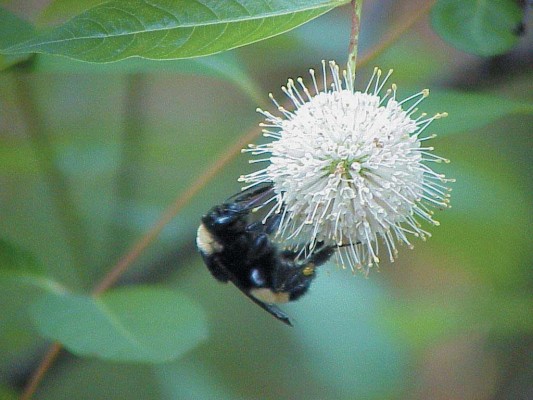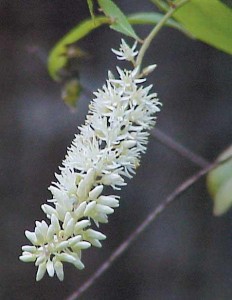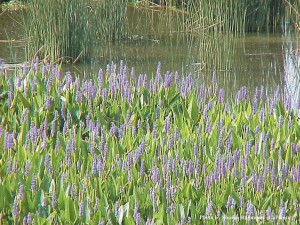and bring home the beauty of real Florida.
Visit FloridaNativeNurseries.org
 Bumblebee nectars on the flower of Buttonbush (Cephalanthus occidentalis), a medium to large-sized shrub that attracts butterflies and is a good choice for lake or pondside margins throughout much of Florida. Photo by Sharon LaPlante.
Bumblebee nectars on the flower of Buttonbush (Cephalanthus occidentalis), a medium to large-sized shrub that attracts butterflies and is a good choice for lake or pondside margins throughout much of Florida. Photo by Sharon LaPlante.
Florida’s beautiful rivers, lakes, creeks, and ponds are supported by unique communities of native plants, from trees to tiny wildflowers. Bring some of this wet and wild beauty into your home landscape with a water garden, and you’ll dramatically increase the population of “watchable wildlife.”
Examine your landscape and consider the options readily available. Perhaps you live on a lake or river. You’ll want to identify the plants you have, remove any invasive non-native plants, and enhance your landscape with additional water-loving natives. Is there a low spot in your landscape, an area that stays wet? It might be a great bog garden, easy to plant and maintain. Maybe you have an area that floods and puddles for a while during the rainy season. Turn this problem into an opportunity, using native plants naturally adapted to periodic flooding. Planting the area will make it more attractive and provide a refuge for frogs. Is there a retention area or drainage swale nearby? Plant it and make it a feature of your neighborhood.

The drooping white flowers of Sweetspire, or Virginia Willow (Itea virginica), are just one attraction of this native landscape shrub, which also provides colorful fall foliage in North Florida. Virginia Willow is a good choice for moist, sunny spots in Central and North Florida, and makes an elegant addition alongside your lakefront or large pond. Photo by Sharon LaPlante.
Start small. There are many options for adding water to a landscape that lacks it, including simple, inexpensive methods that can be finished in a weekend or just a few hours. Start with a simple metal, plastic, or wooden container and just a few potted aquatic plants. Put the container on your deck or walkway where you can easily see and enjoy it, and keep it filled with water. Want something in the ground? There are many effective do-it-yourself products for lining ponds. Edge your pond with flat rocks, logs, and plants to provide hiding and resting places for small creatures.
Worried about mosquitoes? Add some native Mosquito Fish (Gambusia) to the water and they’ll eat the mosquito larvae. Birds attracted to your garden will help control mosquitoes as well. Never use pesticides or you’ll endanger the health of your family and surrounding wildlife.
How to begin? Start with a visit to your FANN retail native nursery, where you can see the aquatic plants that will work best in your landscape. Water gardening is very popular and the hundreds of books, magazines, videos, and websites can be overwhelming. There are many choices of plants and every situation is unique. Your FANN native nursery has the experience and knowledge to help you make the best choices for your landscape.
Plants from the wild? Never remove aquatic plants from natural or even semi-natural settings, such as roadside ditches. Many of our native aquatic plants are threatened or endangered, as are the habitats in which they occur. Obtain your aquatic plants from a professionally licensed and permitted supplier.

Pickerelweed (Pontederia cordata) fills a pond, above, and provides the perfect place for fish, turtles, and ducks to hide. Beautiful blue flower stalks appear in spring and summer; a white-flowered variety is also available. Pickerelweed also provides fruits that are important food for a variety of ducks. Photo by Sharon LaPlante.
Explore naturally wet Florida native plant communities, including Cypress Swamp Forests, Freshwater Marshes, Hydric Hammocks, Mangrove Swamps and Wetland Swamps. These areas have a variety of trees, shrubs and wildflowers that thrive in moist, wet and seasonally flooded conditions.